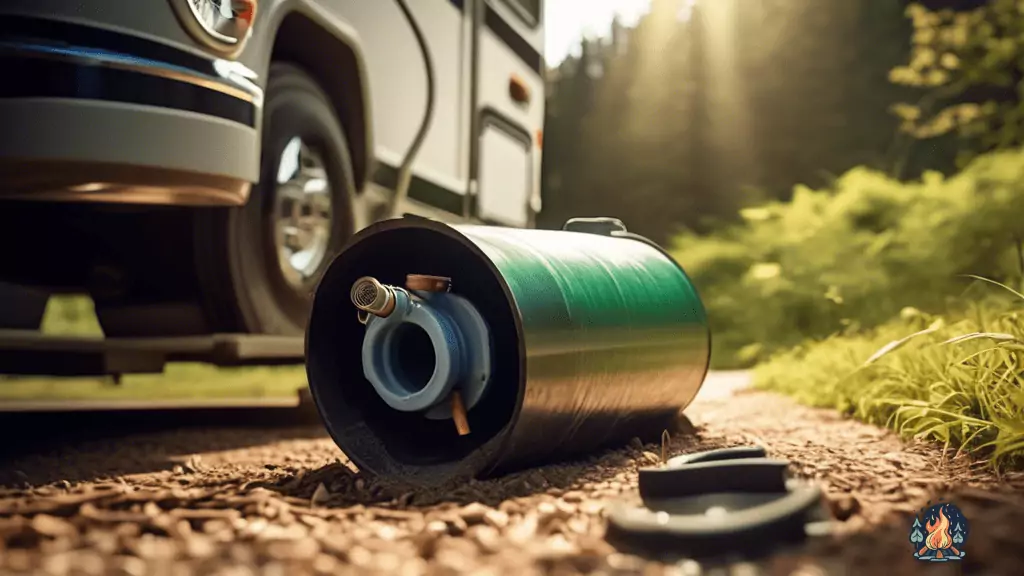Understanding The Basics Of RV Sewer Systems For Beginners
by Kevin Fairbanks • Updated: January 21, 2024
Learn the essentials of RV sewer systems for beginners and enjoy a worry-free journey on the road. Master the basics now!

Are you ready to embark on the grand adventure of RV living? Well, get ready to dive into the world of RV sewer systems! Now, I know what you’re thinking – sewer systems? How exciting! But trust me, understanding the basics of RV sewer systems is the key to a smooth and odor-free journey on the road.
Picture this: you’re cruising down the highway, wind in your hair, and the open road ahead. Suddenly, nature calls. But fear not, for your trusty RV sewer system is here to save the day! These systems may not be the most glamorous part of RVing, but they are essential for keeping things clean and sanitary.
From the types of sewer systems to the equipment you’ll need, we’ve got you covered. So buckle up, my friend, because we’re about to take a deep dive into the wonderful world of RV sewer systems!
Types of RV Sewer Systems
Now that we’ve covered the essentials of RV plumbing, let’s dive into the different types of RV sewer systems and explore which one is the best fit for your travels.
When it comes to dumping your waste, you have a few options to choose from. The most common type of RV sewer system is the traditional gravity dump system. This is where you simply connect your sewer hose to the RV’s waste outlet and let gravity do the work. It’s like watching a magic trick, but instead of a rabbit coming out of a hat, it’s your waste disappearing into the ground. Just make sure you have a good seal on your hose and hold onto it tight, because nobody wants a surprise spray of sewage.
If you’re looking for a more high-tech option, you might want to consider an RV macerator pump system. This nifty contraption grinds up your waste into a fine slurry and then pumps it through a smaller hose. It’s like a blender for your poop! Not only does it make dumping your waste easier, but it also allows you to pump it uphill or into a distant sewer connection. Just be careful not to confuse it with your kitchen blender, unless you’re into that sort of thing.
Ultimately, the type of RV sewer system you choose will depend on your personal preferences and travel needs. So go forth and find the perfect system for you, because nothing says adventure like a well-functioning sewer system!
Essential Equipment for RV Sewer Management
To effectively manage your RV sewer, you’ll need some essential equipment that will make the process easier and less messy. Let’s face it, dealing with sewer waste is not the most glamorous part of RV life, but with the right tools, you can make it a little more bearable. So, what are these must-have items? Take a look at the table below for a handy breakdown:
| Essential Equipment | Description | Why You Need It |
|---|---|---|
| Sewer Hose | This flexible hose is designed to connect your RV’s sewer outlet to the dump station. It’s important to invest in a good quality hose that is durable and leak-proof. | Trust me, you don’t want to deal with a hose that springs a leak while you’re trying to empty your tanks. That’s a mess no one wants to clean up! |
| Sewer Hose Support | This handy device elevates your sewer hose off the ground, allowing for a smooth flow of waste. It helps to prevent any clogs or backups and makes the dumping process more efficient. | Picture this: you’re standing there, holding your hose, and suddenly it starts getting clogged. Not a pretty sight, right? Save yourself the trouble and invest in a sewer hose support. |
| Sewer Hose Adapter | This little gadget allows you to connect your sewer hose to the dump station. It’s available in different sizes to fit various dump station connections, so make sure to choose the right one for your RV. | Trust me, you don’t want to be stuck at a dump station with a hose that doesn’t fit. It’s like trying to fit a square peg into a round hole – it just won’t work! |
Now that you know the essential equipment you need for managing your RV sewer, you can tackle the task with confidence. Remember, having the right tools makes all the difference in making the process less messy and more efficient. So go out there, grab your sewer hose, support, and adapter, and get ready to conquer that RV waste like a pro! And hey, don’t forget to bring your sense of humor along for the ride. After all, laughter is the best way to deal with life’s not-so-pleasant moments!
Proper Waste Disposal and Maintenance
Ensure you regularly empty and clean your RV’s waste holding tanks to maintain proper waste disposal and prevent any potential issues. Trust me, you don’t want to be caught in a situation where your tank decides to have a spontaneous explosion of its contents. It’s not a pretty sight, and definitely not a smell you want to experience.
So, here are a few tips to keep your waste disposal game on point:
- Schedule regular tank emptying: Don’t procrastinate on this one. Make it a part of your RV maintenance routine. Just think of it as a little date with your tank every couple of weeks. It’s like emptying a trash can, but with a lot more…interesting stuff.
- Use the right products: You might be tempted to use household chemicals to clean your tanks, but trust me, that’s not a good idea. Invest in some RV-specific tank treatments that are designed to break down waste and control odors. Your nose will thank you.
- Avoid clogs like the plague: Clogs are the enemy of your RV’s sewer system. So, avoid flushing anything down the toilet that doesn’t belong there. And yes, that includes your grandma’s heirloom diamond ring. Just stick to the basics, like toilet paper and waste. Leave the jewelry for special occasions.
Now that you have these tips, go forth and conquer the world of waste disposal in your RV. Remember, a clean and well-maintained sewer system is the key to a happy and odor-free RV life. And if you ever find yourself in a sticky situation, just remember to laugh it off. After all, life is too short to take sewer systems too seriously.
Troubleshooting Common Issues
If you’re experiencing any problems with your RV sewer system, here are some common issues you may encounter. Let’s be real, dealing with sewer issues is no one’s idea of a good time. But hey, it’s all part of the adventurous RV life, right? So, grab your sense of humor, put on your detective hat, and let’s troubleshoot these pesky problems together.
In the left column of our handy-dandy table, we have the common issues you might face, and in the right column, we’ve got some possible solutions. It’s like having a cheat sheet for your sewer system woes. Just remember, these solutions are here to help you, not to make you feel like a dummy. We’ve all been there, friend.
| Common Issue | Possible Solution |
|---|---|
| Clogs | Time for a little DIY unclogging adventure! Get your plunger or a sewer snake and give it a go. Remember, a gentle approach is best. No need to go all Hulk on your sewer system. |
| Odor | Phew, what’s that smell? It’s time to play detective and find the source. Check your vent stack, make sure it’s clear and not blocked. Don’t forget to give your tank a good cleaning too. Maybe a little dish soap and water will do the trick. |
| Leaks | Uh-oh, looks like you’ve got a leaky situation on your hands. Grab some gloves, a flashlight, and start inspecting your sewer connections. It could be a loose connection or a damaged seal. Tighten things up or replace the seal, and you’ll be leak-free in no time. |
| Slow Drain | Patience is a virtue, my friend. If you’re dealing with a slow drain, it’s time to break out the big guns. Well, not literally, but a sewer enzyme cleaner might do the trick. Pour it down the drain, let it work its magic, and soon enough, your drains will be flowing smoothly again. |
Remember, we’ve all had our fair share of sewer system mishaps. So, don’t sweat it too much. Just take a deep breath, tackle the issue head-on, and before you know it, you’ll be back to enjoying the open road without any sewer-related surprises. Happy troubleshooting!
Tips for Odor Control and Prevention
For effective odor control and prevention in your RV sewer system, you’ll want to regularly clean and disinfect the holding tanks. Now, I know what you’re thinking, "Cleaning a sewer tank? That sounds like a barrel of laughs!" Well, my friend, it may not be the most exciting task in the world, but it’s certainly important if you want to keep your RV smelling fresh and pleasant. Trust me, you don’t want to be the one driving down the road with a cloud of stink trailing behind you.
To clean your holding tanks, start by emptying them completely at a designated dump station. Then, fill the tanks with fresh water and add a tank cleaner or deodorizer. Let it sit for a while to break down any waste and eliminate odors.
After that, give the tanks a good scrub with a long brush or hose, making sure to reach all the nooks and crannies. Rinse thoroughly and repeat the process if necessary. Remember, a little elbow grease now will save you from holding your breath later!
In addition to regular cleaning, there are a few other tips and tricks to help keep those RV odors at bay. First, make sure you’re using RV-friendly toilet paper that breaks down easily in the tanks. This will help prevent clogs and keep everything flowing smoothly.
Second, consider using a toilet odor neutralizer or drop-in deodorizing tablets to keep things smelling fresh between cleanings. And finally, always keep the toilet seat and lid closed when not in use to prevent odors from escaping into your living space.
With these simple steps, you’ll be the envy of the campground with your odor-free RV. Happy camping!
Frequently Asked Questions
Can I use regular household toilet paper in my RV sewer system?
Yes, you can use regular household toilet paper in your RV sewer system. Don’t worry, your toilet won’t turn into a paper-eating monster! Just remember to use it in moderation and avoid excessive flushing. Happy RVing!
How often should I clean and sanitize my RV sewer hoses and tanks?
Don’t let your RV sewer system turn into a stinky mess! To keep things fresh, clean and sanitize your hoses and tanks at least once every three months. Your nose will thank you!
Is it necessary to use RV-specific sewer chemicals or can I use regular household chemicals?
Using regular household chemicals in your RV sewer system may not be the best idea. RV-specific sewer chemicals are designed to break down waste and control odors better, ensuring a smoother and less stinky experience. Trust me, your nose will thank you!
What do I do if my RV sewer system gets clogged?
Oh, so your RV sewer system is clogged? Well, isn’t that just the cherry on top of your vacation! I guess you’ll have to put your plumber hat on and dive right in. Good luck!
How can I prevent leaks and spills when emptying my RV sewage tanks?
To prevent leaks and spills when emptying your RV sewage tanks, make sure to wear protective gear and use a secure hose connection. And remember, it’s all about finesse, not speed. Slow and steady wins the race… and keeps you clean!

Hi, I’m Kevin, a lifelong camping enthusiast and the voice behind Campfire Discoveries. From tent to RV to cabin camping, I’ve explored it all. Join me as we share stories and tips around the campfire, deepening our connection with the great outdoors.
Keep Reading
-
Embark On An Adventurous Camping Travel Experience
Experience the thrill of adventure travel with an unforgettable camping journey in the great outdoors. Click now to embark on a thrilling and memorable experience that will create lifelong memories.
-
Efficient Organization Tips For Your RV Kitchen
Maximize space and make your road trip cooking a breeze with these efficient RV kitchen organization tips! Discover clever storage solutions and meal prep hacks that will revolutionize your culinary adventures. Click here now for a more organized and enjoyable RV kitchen experience!
-
Brew The Perfect Cup With A Camping Coffee Maker
Unleash the ultimate camping coffee maker guide to brew the perfect cup outdoors! Start your day with fresh, delicious coffee – click now and elevate your camping experience.



